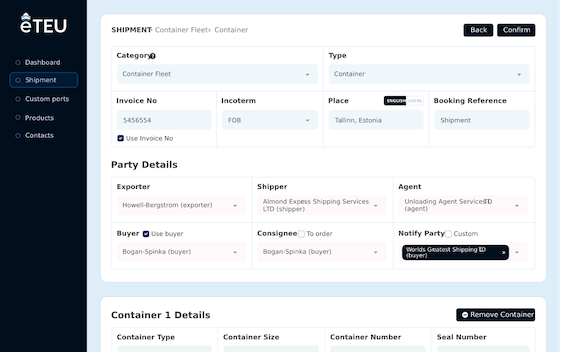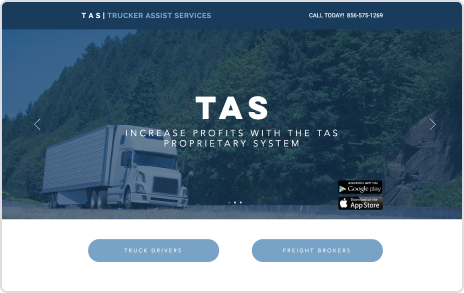Leverage your business capabilities with custom freight management software and become a top player in transport operations with advanced planning and processing capabilities.
Consulting
We can consult on constructing a practical and beneficial technical solution for your product.
Custom software
We deliver highly specialized, cutting-edge solutions for all niches of the logistics industry.
Dedicated teams
Jumpstart your long-term projects with a team of hand-picked professionals.
Services
Technologies
- Adexin
- Services
- Custom software
- Freight Management Systems Development
Freight management systems development
Where we can help
We deliver custom freight management systems with advanced system features to help streamline your logistics and transportation operations. Enhance your interoperability within the supply chain with first-class freight management software.
Freight rate mechanism
Enhance your transport cost management with procurement features that allow you to choose the best possible rates when planning intermodal transport or shipping through your network of business partners. Make the best price-based choice for carriers and freight forwarders for your transport fulfillment and improve shipping cycles.
Demand analytics
Plan your freight with accurate forecasting based on analytics. Allocate better loading space and minimize routes for transporting certain shipments. Benefit from shipment consolidation and ship in bulk to save on shipping costs and container/trailer loading space.
Route planning
Utilize GPS built-in features to plan the most suitable and cost-effective routes. Avoid traffic on highways caused by road accidents or construction. Employ the most appropriate planning approach for various transport modes, whether it is intermodal transport or oversized and heavy equipment transport. Additionally, it strives to cope better with sustainability requirements and lower CO2 emissions by reducing the usage of fossil fuels and energy.
Fleet management
Empower your business with fleet management capabilities regardless of fleet size. Increase transparency and gain better control over assets such as trucks, trailers, and containers. Keep fleet maintenance schedules, licenses, and certificates up to date.
Truck driver scheduling
Manage your teams with better accuracy, plan working hours, and keep an eye on tachograph data to avoid costly fines and exceed working hours for your drivers. Plan and replenish your drivers to optimize working time and maintain workforce satisfaction and flexibility.
Legacy systems integration
Integrate freight management into your existing system with APIs or add the next layer to your ERP system as a fully compatible integrated module. Enhance visibility and collect more accurate information across various departments and systems such as WMS or TMS itself.
Transport document management
Ensure timely and accurate information flows with digital proof of delivery (POD) and generate automated invoices based on the freight calculation system. Improve document management workflow, distribution, and accessibility with a high-quality QMS system for digital document management.
Management information system
Access a range of e-commerce-based services to support your business with fast shipping based on electronic data interchange (EDI). Enable your business to receive booking requests and shipping instructions from your customers. Begin sending electronic shipping schedules, booking confirmations, bills of lading, and trailer and container statuses to your customers.
Our work with freight management development
Take a look at our projects that increased business operability.
Shipping document management platform
Truck owners assistance application
Major industries
We provide freight management system development for certain industries in our niche. We’re the experts with a focus on logistics, transport, and supply chain while ensuring the highest efficiency of our implementations.
Logistics
Logistics is central to the development of a custom freight management system. We engage all our resources and knowledge of information systems and logistics processes to ensure the smooth development of a freight management system. You can get a robust system that supports the logistics framework, optimizes routes, minimizes costs, and maximizes efficiency.
Transportation
Transportation is crucial for freight management systems. We develop customized freight management system modules that are essential for selecting cost-effective carriers, optimizing routes, and ensuring on-time delivery. Get a system tailored to your transportation that allows seamless integration and adaptation to changing trends and regulations.
Supply Chain
Supply chain integration is a key element for custom freight management systems. We help you integrate supply chain modules into your freight management system that enable you to manage inventory in real time, increase visibility, track shipments, and deal with high-demand fluctuations.
Why Adexin
The perfect integration of industry knowledge, developers' skills, and technological expertise with years of experience will help your company get the most out of custom freight management software.
Adexin Tools
We leverage our proprietary Adexin Tools, a ready-made codebase built on our industrial expertise, to accelerate project launches and cut development time by 30%. It includes solutions for data management and outdoor tracking.
Expert group
Our expert group offers direct access to top specialists who can assist with technical and industry-specific challenges, quickly assembling and integrating dedicated teams for your projects.
Logistics industrial focus
We continually enhance our logistics expertise, adopting cutting-edge technologies to drive industry growth and deliver better results for our clients.
Effective process
Recognized by Clutch among top logistics software developers, Adexin ensures high-quality solutions by aligning with client goals and maintaining consistency across all business processes.
Scalable solutions
We design logistics software with built-in scalability, enabling future growth and feature expansion at minimal extra cost.
Full-stack development
Our full-stack teams accelerate your digital transformation with faster time-to-market, improved efficiency, and enhanced customer service.
Adjustable process
We offer flexible contracts and adaptable processes to expand your teams, add new features, and optimize your final product as your needs evolve.
Cloud-based solutions
Cloud technology powers our logistics solutions, enhancing agility, flexibility, performance, and innovation while reducing operational costs.
How custom freight management software can help
The development of customized transportation management systems is about enhancing your ability to schedule shipments and integrate different modes of transportation. Take control of your transportation plus shipping operations.
Deploy green practices
Implementing environmentally friendly practices in transportation management not only aligns with corporate social responsibility goals but also reduces the environmental impact of transportation operations. A custom freight management system helps deploy strategies such as optimizing routes to minimize fuel consumption and using alternative fuels or vehicles with lower emissions.
Lower freight costs
By optimizing routes, consolidating shipments, and negotiating favorable rates with carriers, companies can significantly reduce transportation costs. These capabilities are available from a custom freight management system that uses data analytics to identify cost-saving opportunities and implement efficient freight procurement processes.
Digitize freight processes
Digitizing freight processes streamlines operations, improves communication, and reduces manual errors. Automate the shipping process and Purchase Order with a digital system and user-friendly interface that seamlessly exchanges data between systems. This feature enables real-time tracking of inventory, orders, and shipments.
Improve data exchange
Integration with WMS and DMS, TMS, and EPR systems enables seamless data exchange between platforms and systems, facilitating better visibility and control of the entire supply chain. You can get real-time access to inventory levels, order status, and tracking information. That all improves decision-making and customer retention.
Better setup for the procurement process
Implementation of a robust freight rate mechanism improves transparency and efficiency in the procurement process. This includes negotiating competitive rates with carriers, contracting, and implementing rate management that optimizes shipping.
Remove manual errors
Automating freight processes reduces the likelihood of errors associated with manual data entry, documentation, and communication. This improves accuracy, reliability, and compliance with regulatory requirements. You can ultimately increase customer satisfaction and gain higher trust in your business.
Better traceability
The use of GPS functionality enables real-time tracking and monitoring of shipments throughout the supply chain. This improves visibility, secures your shipments end-to-end and. This feature enables companies to proactively address issues such as delays, theft, or damage.
Effective route and driver planning
Using data analytics and freight management optimization algorithms, companies can plan routes more effectively to minimize transportation time. They can lower fuel consumption and vehicle wear and tear. Custom freight management systems can help predict road conditions, and weather forecasts and manage it all with driver availability. You can improve resource utilization and increase on-time delivery performance.
Main stages of creating freight management systems
We drive changes in business with the most suitable custom development approach for freight management systems development.
- 1
Understanding needs
1 weekThis step usually includes a series of meetings between you and our teams to discuss your business needs and pains. Also, we suggest signing an NDA to protect your sensitive information.
- 2
Solution and estimation
1 weekWhen requirements are clear enough, our team of experts determines the best suitable solution and provides a rough estimation of required time and resources, based on their extensive experience.
- 3
Project planning
1 weekWhen we understand the scope of the project, we will jointly plan the budget, timeline, and team structure. Also, this phase includes drafting an official agreement.
- 4
Phase 1.0
~3-12 monthsAdexin strongly recommends determining which functions and features of the new custom software are critical for the business and need to be implemented and tested in the first place. This phase can also be called the MVP phase. Usually, we follow the Kanban methodology during the logistics software development process. This gives the project flexible planning, fast output, clear focus, and transparency during the development cycle. We apply a full-picture reporting approach to make sure all parties are clear about the progress. This approach includes each team member's daily status reports, the whole team's weekly reports, biweekly demos, and monthly invoicing.
- 5
Phase 1.0 test
~1-2 monthsGetting the initial feedback from real users is very important. Having an MVP helps you to test your assumptions and business model. It allows you to really understand how users use the software, what should be added, and what needs to be fixed in the next development process.
- 6
Phase 2.0 and more
as much as neededCongrats, your first test showed that the project is promising and worth expanding. We will be glad to continue working on your project and grow together. The next phases can contain advanced features, additional functions, and logic requested by your users.
At Adexin, we are strictly focused on flexible software development for supply chain, transportation, and logistics. We remain agile when it comes to planning various software projects, such as freight management system development. We are highly oriented towards results, delivering projects within the required time frame and budget.
By moving in this direction, we're able to adapt to any changes in real-time. You're free to adjust your project specifications during the development process. We are keen to adapt to constantly evolving business requirements arising from ever-changing economic factors. Simply put, Adexin provides crucial and valuable agility to organizations with a high commitment to driving your business development.
Our certifications in logistics

Book a free consultation to discuss your project
FAQ
The following section explains the most nurturing and frequently asked questions about the freight management system. Here, you can find useful answers that can help clarify your point of view and future needs related to software development for freight management.
What is FMS in logistics?
Freight Management System (FMS) is a complex software system designed to optimize and streamline various logistics and freight transportation processes. It includes route planning, carrier selection, shipment tracking, freight optimization, documentation management, and reporting. Using the latest technology developments in software and hardware, FMS enables companies to manage transportation operations effectively. You can improve visibility, reduce costs, and increase customer satisfaction.
What is the role of transportation management?
Transportation management is key in ensuring the smooth and efficient flow of goods throughout the supply chain. Its primary responsibilities include selecting the most cost-effective and reliable carriers. Other elements include helping optimize transportation routes, coordinating shipments, and, managing inventory levels while ensuring timely customer deliveries. Overall, effective transportation management increases operational efficiency, reduces transportation costs, minimizes risk, and ultimately contributes to the company's overall success.
What is an FMS in the supply chain?
From the perspective of a supply chain, a freight management system works as a critical component in managing a supply chain network's transportation and logistics aspects. It integrates with other supply chain management systems, such as warehouse management systems (WMS) and transportation management systems (TMS), to facilitate seamless coordination and communication among various stakeholders.
What affects freight rates?
Freight rates depend on many factors, including fuel prices, market fluctuations caused by economic changes, demand for transportation services, capacity limitations in any company, government regulations, shipping distance, shipment size and weight, carrier availability, and other existing market conditions. Higher fluctuations in any of these aspects can affect freight rates, leading to changes in shipping costs for companies.
What are the advantages of GPS in transportation logistics?
Using GPS technology, companies can track the location of vehicles and shipments in real time. This enables them to predict ETAs accurately and manage delays or problems proactively. GPS also facilitates optimal route planning to avoid congestion and reduce travel time. In the long term, it enhances safety by monitoring vehicle movement, improves driver safety by providing navigational assistance, and supports compliance with regulatory requirements.
What are the advantages of truck driver scheduling in transportation management?
Effective truck driver scheduling is essential to optimize workforce management and ensure efficient transportation operations. You can accurately schedule working hours and break times, which allows companies to maximize driver time utilization while maintaining regulatory compliance to avoid costly fines or penalties. It is all interconnected, and strategic scheduling also helps maximize productivity, improve on-time deliveries, and increase driver satisfaction and retention. This solution ultimately contributes to overall operational efficiency and customer satisfaction.
How can custom transportation management software improve collaboration?
Customized transportation management software can support collaboration among the various stakeholders involved in the transportation process. There is a major shift in providing real-time visibility of shipments and operations. The system facilitates seamless communication and information exchange, which helps streamline workflows and processes. In other words, the custom software solutions enable stakeholders to collaborate more effectively. Enhanced collaboration leads to better coordination of multiple tasks. You can make faster decisions, get better problem-solving, and achieve greater efficiency and success in transportation management.
How does a transportation management system support e-commerce?
Transportation management systems are key in supporting e-commerce operations by facilitating efficient order fulfillment and shipping processes. Such systems enable companies to manage and track online orders. In fact, you can optimize shipping routes and improve carrier selection. You can provide customers with accurate delivery estimates and integrate with e-commerce platforms for seamless order processing.
How is freight management being integrated?
Freight management systems integrate with various systems and platforms across the supply chain to facilitate seamless data exchange and collaboration. Integration can come with warehouse management systems (WMS) for inventory management, transportation management systems (TMS) for route optimization and carrier selection, enterprise resource planning (ERP) systems for overall business management, and electronic data interchange (EDI). It can also integrate with systems for document exchange and e-commerce platforms for order processing and fulfillment. By integrating with these systems, transportation management systems increase visibility, improve efficiency, and enable better decision-making throughout the supply chain.


